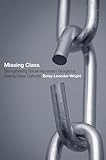Missing class : strengthening social movement groups by seeing class cultures / Betsy Leondar-Wright.
Material type: TextPublication details: Ithaca ; London : ILR Press, an imprint of Cornell University Press, (c)2014.Description: 1 online resource (xi, 274 pages)Content type:
TextPublication details: Ithaca ; London : ILR Press, an imprint of Cornell University Press, (c)2014.Description: 1 online resource (xi, 274 pages)Content type: - text
- computer
- online resource
- 9780801470707
- 9780801470714
- 9781322522586
- HN90 .M577 2014
- COPYRIGHT NOT covered - Click this link to request copyright permission: https://lib.ciu.edu/copyright-request-form
| Item type | Current library | Collection | Call number | URL | Status | Date due | Barcode | |
|---|---|---|---|---|---|---|---|---|
 Online Book (LOGIN USING YOUR MY CIU LOGIN AND PASSWORD)
Online Book (LOGIN USING YOUR MY CIU LOGIN AND PASSWORD)
|
G. Allen Fleece Library ONLINE | Non-fiction | HN90.6 (Browse shelf(Opens below)) | Link to resource | Available | ocn874563407 |
Includes bibliographies and index.
Introduction: activist class cultures as a key to movement building -- Why look through a class lens? : five stories through three lenses -- Applying class concepts to US activists -- Four class categories of activists and their typical group troubles -- Movement traditions and their class cultural troubles -- Where is everybody? : approaches to recruitment and group cohesion -- Class speech differences I : humor and laughter -- Activating the inactive : leadership and group process solutions that backfire -- Class speech differences II : abstract and concrete vocabulary -- Class speech differences III : racial terms -- Diversity ironies : clashing anti-racism frames and practices -- Class speech differences IV : talking long, talking often -- Overtalkers : coping with the universal pet peeve -- Class speech differences V : anger, swearing, and insults -- Activists behaving badly : responses to extreme behavior violations -- Class speech differences VI : missing class talk -- Conclusion : building a movement with the strengths of all class cultures.
Many activists worry about the same few problems in their groups: low turnout, inactive members, conflicting views on racism, overtalking, and offensive violations of group norms. But in searching for solutions to these predictable and intractable troubles, progressive social movement groups overlook class culture differences. In Missing Class, Betsy Leondar-Wright uses a class-focused lens to show that members with different class life experiences tend to approach these problems differently. This perspective enables readers to envision new solutions that draw on the strengths of all class cultures to form the basis of stronger cross-class and multiracial movements. The first comprehensive empirical study of US activist class cultures, Missing Class looks at class dynamics in 25 groups that span the gamut of social movement organizations in the United States today, including the labor movement, grassroots community organizing, and groups working on global causes in the anarchist and progressive traditions. Leondar-Wright applies Pierre Bourdieu's theories of cultural capital and habitus to four class trajectories: lifelong working-class and poor; lifelong professional middle class; voluntarily downwardly mobile; and upwardly mobile.Compellingly written for both activists and social scientists, this book describes class differences in paths to activism, attitudes toward leadership, methods of conflict resolution, ways of using language, diversity practices, use of humor, methods of recruiting, and group process preferences. Too often, we miss class. Missing Class makes a persuasive case that seeing class culture differences could enable activists to strengthen their own groups and build more durable cross-class alliances for social justice.
COPYRIGHT NOT covered - Click this link to request copyright permission:
There are no comments on this title.
